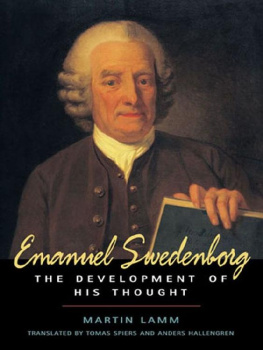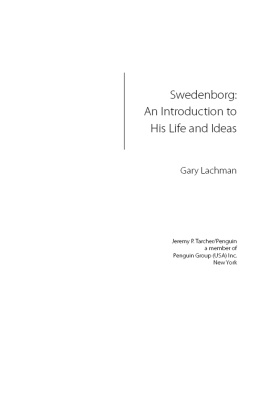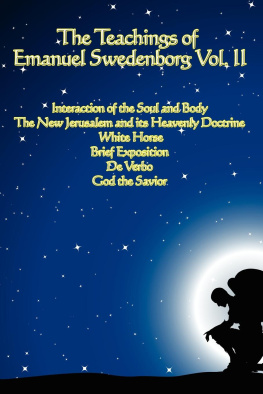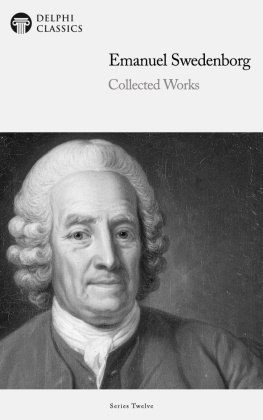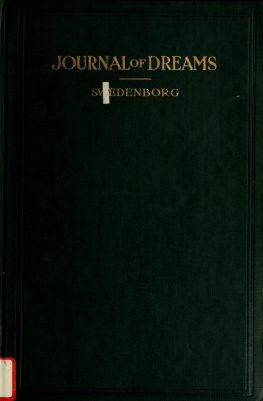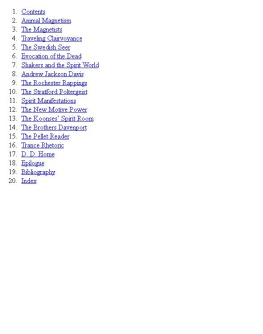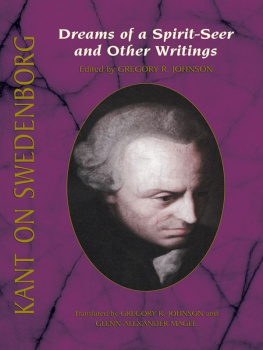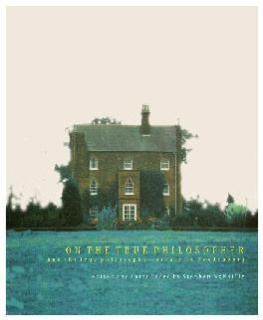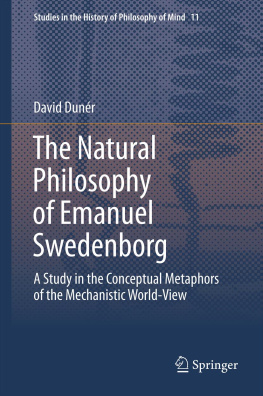Emanuel Swedenborg
Swedenborg Studies/No. 9
Monographs of the Swedenborg Foundation

Emanuel Swedenborg
THE DEVELOPMENT OF HIS THOUGHT
MARTIN LAMM
TRANSLATED BY TOMAS SPIERS AND ANDERS HALLENGREN

Swedenborg Foundation Publishers
West Chester, Pennsylvania
2000 by the Swedenborg Foundation
First published in Swedish as Swedenborg: En Studie ver Hans Utveckling Till Mystiver Och Andeskdare (Stockholm: Hugo Gebers Frlag, 1915) 1915 Martin Lamm
Second Swedish edition, 1987, by Hammarstrm & berg Bokfrlag, with a foreword by Olle Hjern and afterword by Inge Jonsson
The foreword by Paul Valry appeared in the first translation of Swedenborg (Paris: Libraire Stock, Delamain & Boutelleau, 1936) and is reproduced by permission of the estate of Paul Valry and ditions Stock.
All rights reserved. No part of this publication may be reproduced or transmitted in any form or by any means, electronic or mechanical, including photocopying, recording, or any information storage or retrieval system, without prior permission from the publisher.
Swedenborg Studies is a scholarly series published by the Swedenborg Foundation. The primary purpose of the series is to make materials available for understanding the life and thought of Emanuel Swedenborg (16881772) and the impact his thought has had on others. The Foundation undertakes to publish original studies and English translations of such studies and to republish primary sources that are otherwise difficult to access. Proposals should be sent to: Senior Editor, Swedenborg Studies, Swedenborg Foundation, 320 North Church Street, West Chester, Pennsylvania 19380.
Library of Congress Cataloging-in-Publication Data
Lamm, Martin, 18801950
[Swedenborg. English]
Emanuel Swedenborg: the development of his thought / Martin Lamm ; translated by Tomas Spiers and Anders Hallengren.
p. cm. (Swedenborg studies ; no. 9)
Includes bibliographical references and index.
ISBN 0-87785-193-X (hc) ISBN 0-87775-194-8 (pbk)
I. Swedenborg, Emanuel, 1688-1772. I. Title. II. Series.
BX8748 .L3613 2000
289.4'092dc21 00059537
Edited by Richard Smoley
Designed by Sans Serif, Inc., Saline, Michigan
Set in Granjon by Sans Serif, Inc.
Printed in the United States of America.
ISBN-13: 978-0-877-85642-9 (electronic)
CONTENTS
FOREWORD TO FRENCH TRANSLATION (1936)
THOUGHTS AFTER READING MARTIN LAMM'S SWEDENBORG
by Paul Valry
The noble name of Swedenborg sounds strange to us. It awakens all the depths of confused thoughts surrounding the fantastic image of a singular personage, less defined by history than created by literature. I confess that until recently all I knew of him was the remains of readings of many years ago.
Seraphitus-Seraphita, by Balzac and a chapter of Grard de Nerval had previously been my only sources, and into these I had not dipped for some thirty years.
This fading recollection, nevertheless, retained a charm for me. The simple syllabic resonance of the magic name, when I chanced to hear it, evoked memories of incredible associations, of the fascinations of a chimerical science, of the marvel of the considerable influence emanating from reveries; in a word, I loved to picture the uncertain figure of the seer in the frame of the century in which I would choose to have lived.
I think to myself that his epoch was one of the most brilliant and whole that humanity can know. Therein we find the scintillating finale of one world and the strenuous birth pangs of another, the most refined art, all the forces and graces of the spirit. There was magic and differential calculus, the most cynical of the cynics, and the most bizarre among the dreamers. A surplus of intelligence was not lacking, balancedat times within the same mindsby an astounding credulity. All the themes of limitless intellectual curiosity that the Renaissance had recaptured from the ancients or drawn from its own euphoria reappear in the eighteenth century more alive, sharper, and more precise.
Europe, then, accepts the coexistence of mutually contradictory systems. That is the characteristic of a modern type of civilization. Rome and Alexandria had already known such an accumulation of contradictory theses, publicly manifested and debated. In these ancient capitals, the diversity of cults and philosophies were in ferment: no one could ignore, in those environments of fiery intellectualism, the fact that every speculative question had more than one answer. The end product of such relationships and exchanges, often visible in a specific individual, incarnates the disorder and richness of an era.
In the eighteenth century, while the d'Alemberts, the Clairauts, the Eulers were building a rigorously antiseptic, mechanical world on the foundation of entirely novel resources of mathematical analysis; while others researched biology, visualizing diverse philosophies of living nature and striving to trace the origins of what they believed about matter; while the great Linnaeus undertook the immense task of classifying all living organisms, others elaborated diverse metaphysicsstill in the footsteps of the ancientsor extrapolated from Gassendi, Descartes, Spinoza, Leibniz, or Malebranche. In the theological camp, Jansenists, Quietists, and many of other hues disputed among themselves the possession of truth and the empire of souls. Thus, there was no dearth of vigorous spirits.
But if freedom of inquiryhaving become almost legitimate everywhereif the progress of the exact sciences, their stunning success, and the discovery of the entire shape of the world had created a kind of encyclopedic appetitean attitude that rejected nothingthis same thirst for knowledge and power did not disdain the exploration of the intellectual penumbra even into those suspect shadows in which, from the most remote antiquity, the imagination of a larger number of individuals locates the wellspring of power and knowledge and the source of secrets of supernatural importance.
So curiosity and hope coexist in more than one spirit in an astonishing combination. Men like Leibniz or Boyle may appear to us to be too rich in concerns that are too disparate; and the association, in Newton, of the interpretation of the Apocalypse (by way of hypotheses on the astronomy of the Argonauts) with the formulation of the mathematics of fluxion and the theory of universal attraction disconcerts us. But their century abounds in research in all disciplines; and the necessary passion, the cultivation of observation and experiment, does not deliver them from the temptations offered by doctrines and practices mysteriously transmitted.
(I observe in passing that the most prudent and the most positive science of those who dedicate themselves to it with the ardor that leads to discovery demands a certain thirst for marvels. The prodigious, the unexpected, deriving from rigorous deduction or a faultless experimental procedure, endows the mind with one of the deepest joys anyone can know.)
We find, therefore, in the eighteenth century, the generalization, almost the vulgarization, of both normal and degenerate varieties, which kindle the desire to know more than one can know. Adepts multiply, initiates abound, charlatans swarm. The social and political role of the occult becomes immense.
Credulity and skepticism have never been as closely associated and as impartially distributed among the human race as they then were. The symbolism that decodes the universe like a hieroglyphic text; the hermeneutics that attributes to the Scriptures an interpretation more profound than the sense of the letter; the theosophy that awaits and receives communication from an immediate light; andstill more daring, more disturbing, and ambitious in their operating proceduresmagic, alchemy, divination by stars, by dreams, by evocationall coexist in more than one spirit along with the most limpid culture and the discipline of the exact sciences.

